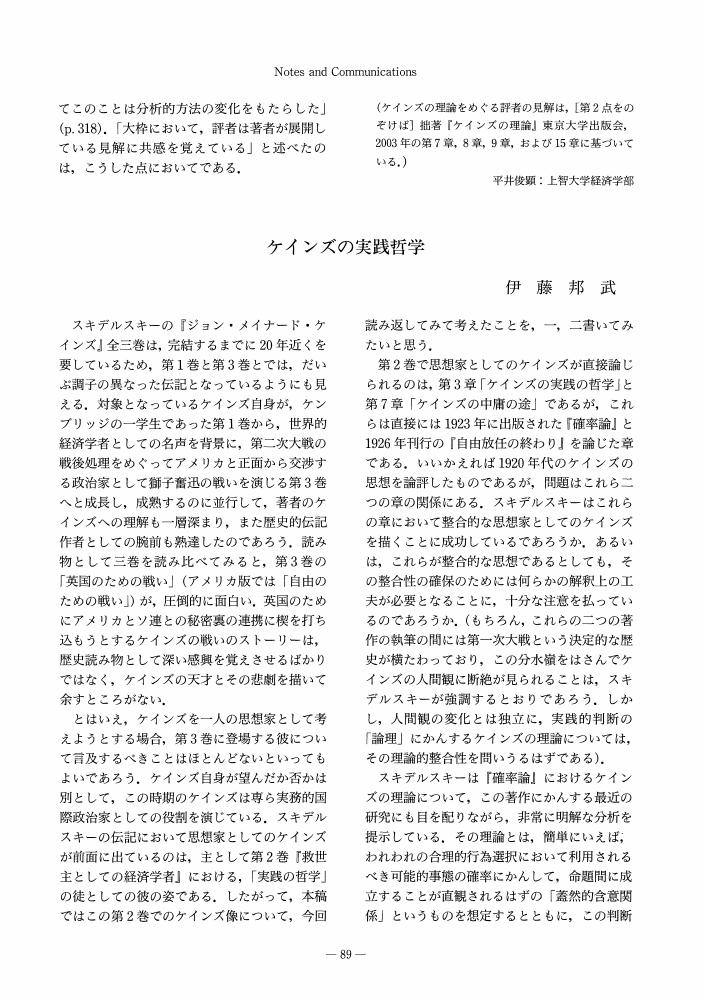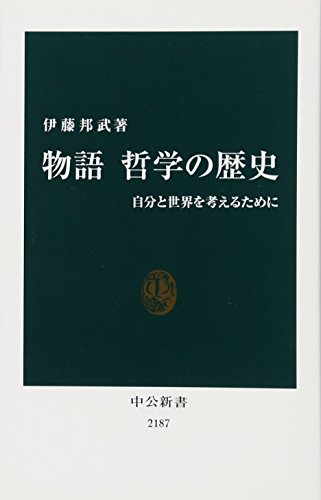4 0 0 0 OA チャールズ・パースの「アガペー主義」
- 著者
- 伊藤 邦武
- 出版者
- 宗教哲学会
- 雑誌
- 宗教哲学研究 (ISSN:02897105)
- 巻号頁・発行日
- vol.23, pp.16-31, 2006 (Released:2019-03-21)
Charles Peirce developed his cosmological system in the series of articles published in The Monist from 1891 to 1893. Peirce constructed his system on the foundation of the three doctrines of “Tychism”, “Synechism” and “Agapism”. Of these three doctrines the least known theory is “Agapism”. In this paper, I try to present the material necessary for the understanding of this doctrine. Peirce’s agapism or the theory of evolutionary love is a curious mixture of his criticism of Darwinism and his sympathy to Henry James, Sr.’s Swedenborgian theology. He contends that the evolution of the universe cannot be accounted for by means of Darwinian logic of chance. It is his contention that the process of cosmological evolution should be interpreted as the work of divine creative love, whose essence is to let the creatures be independent from, but at the same time, return to harmony with the creator. This doctrine of creation as evolution is adopted by Peirce and reinterpreted into a complex doctrine about the interactive relationship between mind and matter. The resultant picture of the evolution of the universe is that of getting more and more lawful but reasonable.
4 0 0 0 OA 合理性の自然化
- 著者
- 伊藤 邦武
- 出版者
- 日本科学哲学会
- 雑誌
- 科学哲学 (ISSN:02893428)
- 巻号頁・発行日
- vol.25, pp.1-13, 1992-11-14 (Released:2009-05-29)
- 著者
- 伊藤 邦武
- 出版者
- 京都大学哲学論叢刊行会
- 雑誌
- 哲学論叢 (ISSN:0914143X)
- 巻号頁・発行日
- vol.19, pp.96-107, 1992-09-01
4 0 0 0 OA <特別寄稿>ヒュームの確率論
- 著者
- 伊藤 邦武
- 出版者
- 京都大学哲学論叢刊行会
- 雑誌
- 哲学論叢 (ISSN:0914143X)
- 巻号頁・発行日
- vol.28, pp.58-68, 2001-09-01
3 0 0 0 IR ヴィジョンとしての宇宙論-チャールズ・パースと「スフィンクスの謎」(1)-
- 著者
- 伊藤 邦武
- 出版者
- 京都大学大学院文学研究科哲学研究室
- 雑誌
- 京都大学文学部哲学研究室紀要 : Prospectus
- 巻号頁・発行日
- vol.7, pp.94-122, 2004-12-10
3 0 0 0 OA パースの記号論的認識論
- 著者
- 伊藤 邦武
- 出版者
- 京都大学哲学論叢刊行会
- 雑誌
- 哲学論叢 (ISSN:0914143X)
- 巻号頁・発行日
- vol.7, pp.1-12, 1980
2 0 0 0 OA ラスキンの藝術経済論(1)
- 著者
- 伊藤 邦武
- 出版者
- 京都大学哲学論叢刊行会
- 雑誌
- 哲学論叢 (ISSN:0914143X)
- 巻号頁・発行日
- vol.36, pp.19-31, 2009
2 0 0 0 OA 隠喩としての自然 ケプラーのメタ・アブダクション
- 著者
- 伊藤 邦武
- 出版者
- 日本科学哲学会
- 雑誌
- 科学哲学 (ISSN:02893428)
- 巻号頁・発行日
- vol.20, pp.87-100, 1987-11-05 (Released:2009-05-29)
2 0 0 0 自然主義的認識論と懐疑論:ヒュームの場合
- 著者
- 伊藤 邦武
- 出版者
- 日本哲学会
- 雑誌
- 哲学 (ISSN:03873358)
- 巻号頁・発行日
- vol.2003, no.54, pp.55-70,240, 2003
Naturalistic epistemology is generally considered to be a strong antidote to the traditional foundational epistemology, and it is believed to be able to evade the sceptical challenge to the traditional foundational project. This belief, however, should be thought again. Naturalistic epietemology and philosophical scepticism can coexist and mutually sustain each other. This is at least the case in the arguments of Hume's Treatise, which is widely recognized as a precursor of current naturalistic epistemology. According to Hume, sceptical argument against reason suggests the validity of naturalism in the theory of knowledge, but naturalism, in turn, encourages the adoption of further sceptical stance to the claim of reason. We can see the novelty of Hume's argument against classical scepticism in this complex combination of scepticism and naturalism.
2 0 0 0 IR ヴィジョンとしての宇宙論-チャールズ・パースと「スフィンクスの謎」(2)-
- 著者
- 伊藤 邦武
- 出版者
- 京都大学大学院文学研究科哲学研究室
- 雑誌
- 京都大学文学部哲学研究室紀要 : Prospectus
- 巻号頁・発行日
- vol.8, pp.185-225, 2005-12-10
2 0 0 0 IR アリストテレスの経済思想再考
- 著者
- 伊藤 邦武
- 出版者
- 岩波書店
- 雑誌
- 経済研究 (ISSN:00229733)
- 巻号頁・発行日
- vol.67, no.2, pp.134-146, 2016-04-22
アリストテレスの経済思想を,その代表的なテキストである『ニコマコス倫理学』と『政治論』の議論から検討する.彼の「交換的正義」の議論は次のように要約される.さまざまな商品には,それ自身の使用価値が内属しているが,この価値は互いに非通約的である.商品は他方,交換価値にかんして通約的となるが,この価値の基準となるのはそれらの「必要性」である.この必要性を量的に比較するための媒体となるために,貨幣が約束によって成立している――.この説にかんして問題になるのは「必要」という概念の意味と,それを媒介する貨幣が「約束」にもとづいて成立するということの意味である.前者の必要概念についてはこれまでの解釈において主として三つの理解が提出されており,近年ではこれを「その財を分配する者の社会における地位に従った必要」とする理解が有力となっている.しかし,後者の「約束」の意味についは必ずしも共有された解釈がない.本論ではこの意味の理解のために,後のヒュームがその道徳論で提起した「合意」論を活用するべきだと論じる.Aristotle develops his theoryof economic justice in Nicomachean Ethics and Politics. The theoryis interesting because his discussion of economic justice is connected to his larger concern about the relationship between the commensurable and incommensurable. Commodities are mutually incommensurable from the viewpoint of their use value but commensurable from that of exchange value. Theyare reduced to be mutuallycommensurable on the basis of "need (chreia)". The medium of this quantitative comparison is money, which is introduced by "convention (hypothesis)". There have been various interpretations concerning the meaning of "need", but little discussion about the meaning of "convention". I propose in this paper that Hume's analysis of convention in The Treatise of Human Nature could be profitably made use of for understanding the Aristotelian idea of convention.
2 0 0 0 OA ヴィジョンとしての宇宙論-チャールズ・パースと「スフィンクスの謎」(2)-
- 著者
- 伊藤 邦武
- 出版者
- 京都大学大学院文学研究科哲学研究室
- 雑誌
- 京都大学文学部哲学研究室紀要 : Prospectus
- 巻号頁・発行日
- vol.No.8, pp.185-225, 2005-12-10
1 0 0 0 OA ケインズの科学方法論
- 著者
- 伊藤 邦武
- 出版者
- 日本科学哲学会
- 雑誌
- 科学哲学 (ISSN:02893428)
- 巻号頁・発行日
- vol.31, no.2, pp.75-87, 1998-11-15 (Released:2009-05-29)
- 参考文献数
- 12
As a methodologist of science, John Maynard Keynes scrutinised the classical induction theory of Bernoulli and Laplace and proposed a new set of principles of induction in A Treatise on Probability (1921). He took up the same subject, after the publication of The General Theory of Employment, Interest and Money (1936), in his debate with Jan Tinbergen on econometrics. Keynes's criticism of econometrics is generally considered to be done on the ground of the principles of induction which he formulated in the former book. However, this standard interpretation seems odd, because those principles depended heavily on his theory of probability and he radically changed this analysis of probability in his mature economic theory. If he kept the theory of induction intact in his criticism of econometrics, then he was curiously absent-minded. I do not think that Keynes was such an inconsistent thinker, and I believe that his later theory of induction should be understood from the perspective of a much modern type of theory, i.e., something like a Kuhnian paradigm-bound view of science, or one of its more sophisticated variants. It is founded on the concept of inter-personal probability or 'expectation', and it is also constructed to be amenable to the interplay of 'theory and practice'.
1 0 0 0 OA ケインズの実践哲学
- 著者
- 伊藤 邦武
- 出版者
- 経済学史学会
- 雑誌
- 経済学史学会年報 (ISSN:04534786)
- 巻号頁・発行日
- vol.45, no.45, pp.89-91, 2004 (Released:2010-08-05)
1 0 0 0 IR 『論理哲学論考』における「思考」と「自我」の規定
- 著者
- 伊藤 邦武
- 出版者
- 京都大学哲学論叢刊行会
- 雑誌
- 哲学論叢 (ISSN:0914143X)
- 巻号頁・発行日
- no.5, pp.1-9, 1978-08-01
1 0 0 0 IR フィクションの世界とは何か
- 著者
- 伊藤 邦武
- 出版者
- 龍谷哲学会
- 雑誌
- 竜谷哲学論集 (ISSN:09176284)
- 巻号頁・発行日
- no.29, pp.17-44, 2015
1 0 0 0 チャールズ・パースの「アガペー主義」
- 著者
- 伊藤 邦武
- 出版者
- 宗教哲学会
- 雑誌
- 宗教哲学研究 (ISSN:02897105)
- 巻号頁・発行日
- vol.23, pp.16-31, 2006
Charles Peirce developed his cosmological system in the series of articles published in <i>The Monist</i> from 1891 to 1893. Peirce constructed his system on the foundation of the three doctrines of "Tychism", "Synechism" and "Agapism". Of these three doctrines the least known theory is "Agapism". In this paper, I try to present the material necessary for the understanding of this doctrine. Peirce's agapism or the theory of evolutionary love is a curious mixture of his criticism of Darwinism and his sympathy to Henry James, Sr.'s Swedenborgian theology. He contends that the evolution of the universe cannot be accounted for by means of Darwinian logic of chance. It is his contention that the process of cosmological evolution should be interpreted as the work of divine creative love, whose essence is to let the creatures be independent from, but at the same time, return to harmony with the creator. This doctrine of creation as evolution is adopted by Peirce and reinterpreted into a complex doctrine about the interactive relationship between mind and matter. The resultant picture of the evolution of the universe is that of getting more and more lawful but reasonable.
1 0 0 0 OA 自然主義的認識論と懐疑論
- 著者
- 伊藤 邦武
- 出版者
- 日本哲学会
- 雑誌
- 哲学 (ISSN:03873358)
- 巻号頁・発行日
- vol.2003, no.54, pp.55-70,240, 2003-04-01 (Released:2009-12-08)
Naturalistic epistemology is generally considered to be a strong antidote to the traditional foundational epistemology, and it is believed to be able to evade the sceptical challenge to the traditional foundational project. This belief, however, should be thought again. Naturalistic epietemology and philosophical scepticism can coexist and mutually sustain each other. This is at least the case in the arguments of Hume's Treatise, which is widely recognized as a precursor of current naturalistic epistemology. According to Hume, sceptical argument against reason suggests the validity of naturalism in the theory of knowledge, but naturalism, in turn, encourages the adoption of further sceptical stance to the claim of reason. We can see the novelty of Hume's argument against classical scepticism in this complex combination of scepticism and naturalism.
1 0 0 0 物語哲学の歴史 : 自分と世界を考えるために
1 0 0 0 OA ケンブリッジ、オクスフォード、LSEの経済思想と現代福祉国家の変容
19世紀末以降のケンブリッジ、オクスフォード、LSEの経済思想の展開を、現代福祉国家の変容・危機を視野に入れて、共同研究を進め成果を得た。具体的には、1. 「創設期の厚生経済学と福祉国家」から厚生経済学史の再検討へ、2. リベラリズムの変容と福祉国家-ニュー・リベラリズムからネオ・リベラリズムへ、3. マーシャル、ケインズと同時代の経済思想、4. ケインズと現在の世界経済危機-戦間期との比較考証、の4点を中心に国際共同研究を進め成果を得た。



